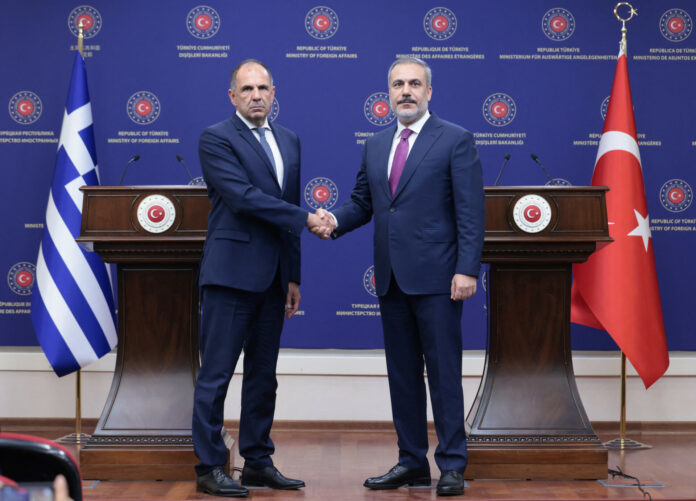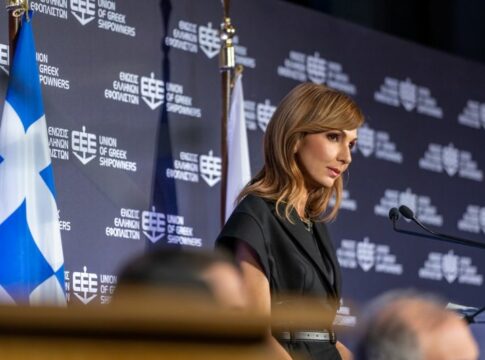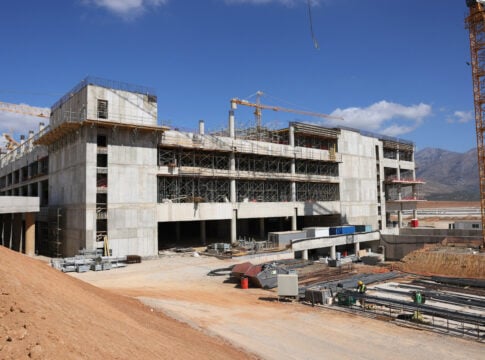Turkish Foreign Minister Hakan Fidan spoke of a “fruitful meeting” in his joint statements with his Greek counterpart, George Gerapetritis, after the conclusion of their talks in Ankara.
At the beginning of his statements, the Turkish Foreign Minister thanked the Greek government for the assistance during the devastating earthquakes, while he also expressed his solidarity with our country for the fires. “We are always ready to help,” he underlined.
The head of Turkish diplomacy characterized the dialogue between Greece and Turkey as a positive development, noting the mutual will for its continuation. He also expressed the view that problems can be resolved through constructive dialogue.
During the meeting, the bilateral relations were examined and the road map for the coming months was set, in view of the meeting between Greek Prime Minister Kyriakos Mitsotakis and Turkish President Recep Tayyip Erdogan in New York on September 18.
“We have differences in the Aegean … we discussed these issues,” the Turkish Foreign Minister said, while regarding the eastern Mediterranean, he reiterated Ankara’s commitment “to the principle of fair sharing.”
As he said, the two ministers exchanged views on the Cyprus issue. “Our positions are known,” he noted, adding that during the meeting they also discussed the steps that can be taken to develop trade and economic relations.
Regarding the issue of migration, the Turkish Foreign Minister emphasized that “it should not be a field of competition, but of cooperation” and added: “We do not want to see any more losses of life.”
The agenda also included the development of cooperation in the field of tourism. Additional regional issues were discussed, such as developments in Ukraine.
“We are ready to continue the dialogue and develop our relations with Greece,” Hakan Fidan concluded.
Gerapetritis: Build on what unites us
We share the need to establish relations of coexistence and tolerance with mutual respect, the Greek Foreign Minister George Gerapetritis said. The foreign minister stated that there is a will “to build on what unites us” and “to better understand what divides us”, while he stressed the need to maintain the climate of calm.
“We know that the distance created over time will not be covered overnight. We are willing and ready to invest in honesty and understanding,” he noted, while underlining that universal application of international law is required.
Gerapetritis outlined the following roadmap:
The political dialogue, which will start under the responsibility, from the Greek side, of Deputy Minister Alexandra Papadopoulou on October 16.
The implementation and strengthening of the MOUs in the immediate future.
Talks to promote the positive cooperation agenda, in areas such as investments, agriculture, tourism, trade, shipping, the climate crisis and which will be restarted under the responsible deputy minister Kostas Fragogiannis.
The mission of the two ministers, as he pointed out, is:
- To resolve issues that arise between the two countries and de-escalate tension in order to prevent potentially dangerous situations.
- To direct the discussions taking place between the two sides at all levels, i.e. political dialogue, positive agenda and confidence building measures, so that there is continuous monitoring, unified approach and high accountability to produce beneficial and tangible results.
- To prepare the contacts of the two leaders, so that a lasting strong political mandate and legitimacy at the highest level emerges.
Key points will be the meeting of Greek Prime Minister Kyriakos Mitsotakis with Turkish President Recep Tayyip Erdogan on September 18 and the organization of the Supreme Cooperation Council in Thessaloniki, after 7 years.
Regarding the Cyprus issue, he underlined that the Greek positions are known, noting that the immediate resumption of talks is a crucial step.
Referring to Turkey’s European perspective, he said that Greece has always supported it, adding however that the conditions must be met.
He also spoke about the need for cooperation in migration, in order to deal with traffickers’ networks.














